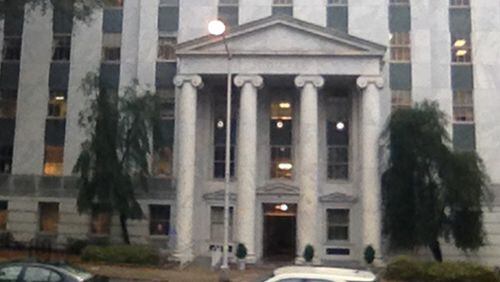The Georgia Supreme Court on Wednesday declined to fully approve an opinion that sought to keep courtrooms open to the public except in the most unusual of circumstances.
The Judicial Qualifications Commission opinion, heralded by First Amendment advocates, said judges may close a courtroom only on a case-by-case basis and only after making a finding on the need to do so. But the state high court told the JQC to reconsider the opinion and expressed concern that the judicial watchdog agency had "wandered into a field of law that is unclear and unsettled, something that is beyond its purview."
In particular, the Supreme Court took issue with the JQC saying it was unconstitutional for judges to allow security personnel to ask people who arrive in court to identify themselves and state their business, and to exclude all children from court proceedings.
There are no clear court precedents that either allow or prohibit such practices. And because of that, some judges will be put in the position of either following the law as they understand it, even if it’s contrary to the JQC’s opinion, or yielding to the commission’s point of view, even if they think it’s wrong, the ruling said.
The JQC, which oversees judicial conduct and sets ethics rules for judges to follow, issued its open-courts advisory opinion in 2013. But it was challenged by the Council of State Court Judges.
On Wednesday both sides said they were satisfied with the court’s decision.
DeKalb County State Court Judge Wayne Purdom said the council was “very pleased” with the ruling and the high court’s willingness to allow judges to “control the courtroom and its security while vindicating the right of public access to court proceedings.”
Purdom added, "As the court said, we all make mistakes. It's nice to have a little clarity on what sort of mistakes are honest mistakes and what sort are a matter of concern for the JQC."
Athens attorney Ed Tolley, a JQC member, said the ruling struck the right balance in ensuring that courts remain open to the public and allowing judges to make sure their courtrooms are safe and secure.
“I really don’t see anything that bothers me,” Tolley said. “I think everybody understands at this point that everything should be done to ensure court proceedings are open to the public.”
In 2014, the Georgia First Amendment Foundation recognized the JQC with its annual award, saying its opinion had removed many barriers that prohibited public access to the courts. (The foundation's president is Shawn McIntosh, a deputy managing editor at The Atlanta Journal-Constitution.)
Foundation board member Cynthia Counts, an Atlanta attorney, said she was pleased with the state high court’s decision.
“Overall, it’s fair,” she said. “It makes clear that courtrooms are presumptively open to the public. The public’s right to access has been reaffirmed.”
Southern Center for Human Rights attorney Atteeyah Hollie, who has successfully filed lawsuits to open courtrooms to the public, was not so sure.
“The JQC opinion got the attention of Georgia judges in ways that our Constitution and state laws couldn’t,” she said. “To roll back core provisions of this important statement signals to judges and the public that the constitutional right to observe our courts is an unsettled question, and that’s a dangerous thing.”
In its unanimous ruling, the court said judges shouldn’t be put in a position of trying to decide what’s right — either the law as they understand it or the JQC advisory opinion that they might disagree with — with the specter of facing possible discipline if they make the wrong decision.
“To permit the commission to put a judge in that position would compromise the independence of the judiciary,” the ruling said. “Until it is clear and settled … whether and to what extent the practices at issue are unconstitutional, it is not for the commission to opine about what the Constitution means.”
At this time, the state Supreme Court said, it was not going to “definitively resolve questions that are now unclear and unsettled.” Constitutional law should develop through the ordinary course of litigation, not through the issuance or review of advisory opinions, the court said.
About the Author







